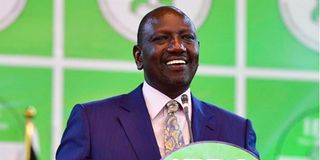Ruto’s presidency will be a study in contradictions

Kenyan President-Elect William Ruto delivers a speech at the Bomas of Kenya Tallying Centre in Nairobi on August 15, 2022.
What you need to know:
- Ruto has demonstrated that he had a plan, and a clear strategy and amassed the resources he needed to fund his ambitions.
- But his key advantage may well be the spirited campaign that President Uhuru Kenyatta mounted against him.
- He is a contradiction of admirable energy, resolve and faith of the truly pious, and ruthlessness and connivance of a cardsharper.
The aftermath of a general election is almost always predictable – celebrations and bonhomie for the victors comingle with the pain, tears and shock of the losers.
For the vast majority, life goes on because they take elections as just an event in which very many excited people give jobs to politicians to do whatever they want.
President-elect William Ruto and his team are ecstatic over their improbable victory.
From his command centre in Karen, he is oozing confidence, a man in charge and eager to get down to the business of running the country.
The flurry of meetings being reported from there signal serious intent at this early stage.
He is assembling the team that will assist him to deliver on his numerous campaign promises.
The presidential election loser Raila Odinga and his supporters are glum and despondent but also defiant.
They refuse to concede and are challenging the result in court.
Unlucky for the fifth time, it must be a particularly painful loss for Mr Odinga.
But as a true patriot, he is preaching calm and disputing the election in the manner prescribed by law – through the court.
It will be an interesting four or so weeks as legal minds wrestle in court before the Supreme Court judges affirm or annul Dr Ruto’s victory.
Court drama
At the centre of the court drama will be the Independent Electoral and Boundaries Commission (IEBC), whose performance as an arbiter of the electoral process will be scrutinised closely.
The fact that the IEBC split on the day of announcing the presidential election results taints the integrity of the commissioners – with the losing side embracing the dissenting four, while the winning side glorifies Chairman Wafula Chebukati and his two colleagues as true heroes.
Of course, both positions cannot be right.
Across the country, the national reality is being played out in the counties.
All governors must be sworn in by August 26 and they all are grappling with the immediate task of setting up their teams, trying to define priorities and honing delivery strategies.
But Kenyans will be excused if they are somewhat sceptical about the honesty attending these critical tasks.
They have good reason to be – corruption and tribalism being at the heart of this doubt.
President-elect Ruto will be particularly watched. Many are still in disbelief over the enormity of his achievement although they should not be.
He signalled his intention to run for President many years ago.
He has demonstrated that he had a plan, and a clear strategy and amassed the resources he needed to fund his ambitions.
And funding he did, with churches being the primary beneficiary. He expended prodigious amounts of energy running an almost maniacal campaign.
But his key advantage may well be the spirited campaign that President Uhuru Kenyatta mounted against him.
It did not go down well with the voters of the mountain region who felt that it was unfair, dishonest and disingenuous of the President to oppose the one person that helped him get to power in the first place.
Sympathy votes played a big part in this victory, as did raw hunger and willpower.
So now that he has it, pending the court decision, what can Kenyans expect?
Is Ruto going to be the statesman he is promising to be and agree to work with the people that made his life quite uncomfortable?
There are Cabinet secretaries and senior civil servants that were very uncooperative, even rude to the Deputy President.
The President-elect says he will work with them and it is a pledge whose fulfilment many will be watching closely.
Both Dr Ruto and his deputy, Rigathi Gachagua, have been accused of and/or linked to acts of alleged corruption, although they both deny it and some matters are still active in court.
Their relationship with corruption, which many place at the heart of Kenya’s economic pain, will be a matter of great interest.
Wishful and naïve
Their campaign pledge to allow institutions created to fight corruption to do their job has been dismissed as wishful and naïve because many of those institutions are active facilitators of the vice.
Ruto and his team will have to find another way of winning over jaded Kenyans.
His first test comes soon enough in the composition of his Cabinet and other key appointments.
His half of the 2013 Cabinet formed with President Kenyatta has seen him labelled as a tribalist. It is a tag he must shed even if the temptation not to will be powerful.
That others before him were almost shameless in their ethnic bias should provide even greater motivation for him to be different.
He is a contradiction of admirable energy, resolve and faith of the truly pious, and ruthlessness and connivance of a cardsharper.
Kenyans await to see which characteristic could dominate the presidency.
Mr Mshindi, a former Editor-in-Chief of Nation Media Group, is now consulting. [email protected]; @TMshindi





